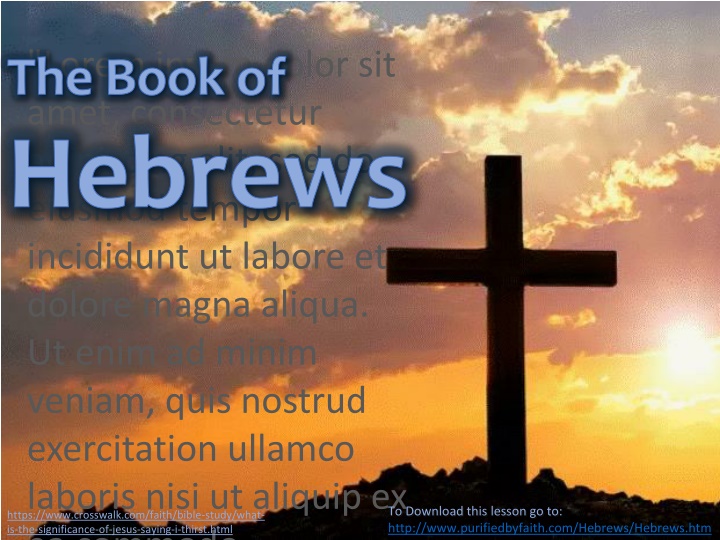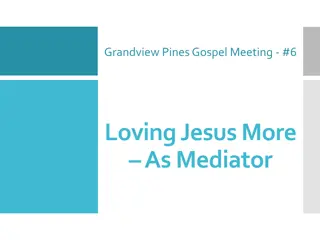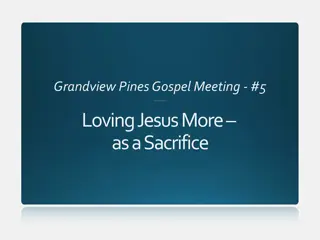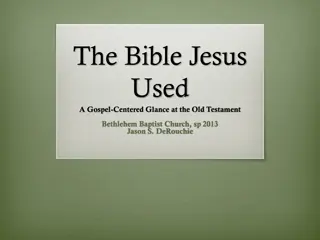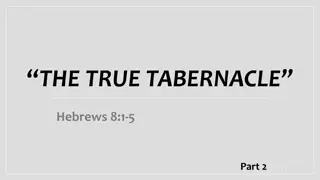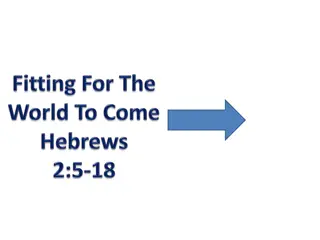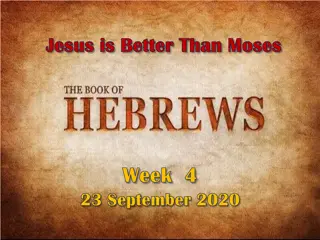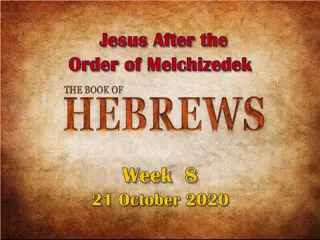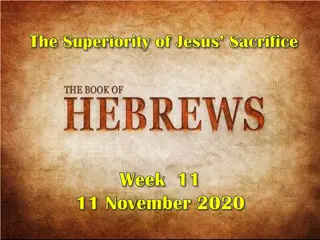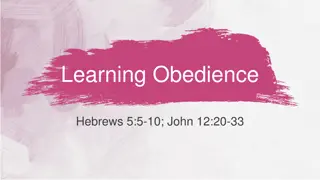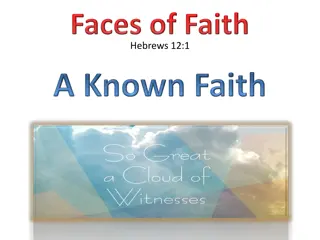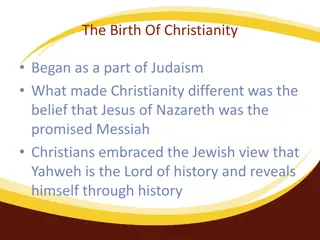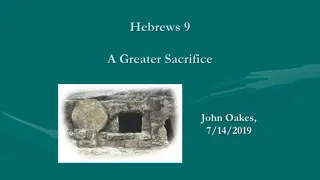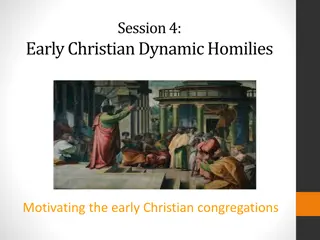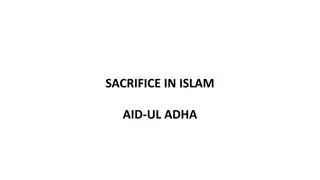The Book of Hebrews Summary: Jesus - Better Than Sacrifice
Explore the profound teachings of The Book of Hebrews focusing on the superiority of Jesus over the old covenant sacrificial system. Discover how Jesus' completed sacrifice brings final forgiveness and sanctification for believers.
Download Presentation

Please find below an Image/Link to download the presentation.
The content on the website is provided AS IS for your information and personal use only. It may not be sold, licensed, or shared on other websites without obtaining consent from the author.If you encounter any issues during the download, it is possible that the publisher has removed the file from their server.
You are allowed to download the files provided on this website for personal or commercial use, subject to the condition that they are used lawfully. All files are the property of their respective owners.
The content on the website is provided AS IS for your information and personal use only. It may not be sold, licensed, or shared on other websites without obtaining consent from the author.
E N D
Presentation Transcript
"Lorem ipsum dolor sit amet, consectetur adipiscing elit, sed do eiusmod tempor incididunt ut labore et dolore magna aliqua. Ut enim ad minim veniam, quis nostrud exercitation ullamco laboris nisi ut aliquip ex ea commodo The Book of Hebrews To Download this lesson go to: http://www.purifiedbyfaith.com/Hebrews/Hebrews.htm https://www.crosswalk.com/faith/bible-study/what- is-the-significance-of-jesus-saying-i-thirst.html
Outline of Hebrews Jesus is Better I. Jesus Is Better Than the OT Prophets (1:1-4) II. Jesus Is Better Than the Angels (1:5-2:18) III. Jesus Is Better Than Moses (3:1-4:13) IV.Jesus Priesthood Is Better Than the Levitical Priesthood (4:14-10:18)
Outline of Hebrews IV.Jesus Priesthood Is Better Than the Levitical Priesthood (4:14-10:18) A. Jesus Was Appointed By God to Be Our Compassionate But Sinless High Priest (4:14 5:10) B. Jesus Is Better Don t Apostatize (5:11-6:20) C. Jesus Is a Priest After the Order of Melchizedek (7:1-28) D. Jesus Is the Mediator of a New Covenant That Is Far Superior to the Old Covenant (8:1-13) E. Jesus Sacrifice Is Better Than the Temple Sacrifices (9:1-10:18)
Outline of Hebrews A. Jesus Sacrifice Is Better Than the Temple Sacrifices (9:1-10:18) 1. Ministry Under the Old Covenant. (9:1-10) 2. Ministry Under the New Covenant (9:11-14) 3. Further Reflections on the New Covenant (9:15-10:18) a. The Need for the Death of the Covenant Ratifier (9:15 22) b. The Need for the Ultimate to Replace the Type (9:23 28) c. The Repetition of the OT Sacrifices Shows Their Inadequacy (10:1-4) d. Jesus Once-for-All Sacrifice Cancelled the Old System (10:5-10) e. Jesus Completed Sacrifice (10:11-14) f. In the New Covenant We Experience Final Forgiveness (10:15-18)
Jesus Completed Sacrifice (10:11-14) 11 And every priest stands daily at his service, offering repeatedly the same sacrifices, which can never take away sins. 12 But when Christ had offered for all time a single sacrifice for sins, he sat down at the right hand of God, 13 waiting from that time until his enemies should be made a footstool for his feet. 14 For by a single offering he has perfected for all time those who are being sanctified.
11 And every priest stands daily at his service, offering repeatedly the same sacrifices, which can never take away sins. In this section, the author demonstrates the glorious finality of what Christ s sacrifice has accomplished by first listing a number of characteristics of the old covenant sacrificial system and then contrasting them with the sacrifice offered by Christ. The first characteristic of the old covenant sacrificial system to which he draws our attention is this: every priest had to stand as he ministered. At that time the LORD set apart the tribe of Levi to carry the ark of the covenant of the LORD to stand before the LORD to minister to him and to bless in his name, to this day. (Deut 10:8) And if a Levite comes from any of your towns and ministers in the name of the LORD his God, like all his fellow Levites who stand to minister there before the LORD (Deut 18:6-7) Schreiner, Thomas R. Evangelical Biblical Theology Commentary - Hebrews; pp. 299-300
11 And every priest stands daily at his service, offering repeatedly the same sacrifices, which can never take away sins. The old covenant priests must stand because their work is never completed, therefore they must continue to offer sacrifices. A second characteristic of old covenant sacrifices is demonstrated by the burnt offering: it must be offered every day: Now this is what you shall offer on the altar: two lambs a year old day by day regularly. (Ex 29:38) The author couldn t be more emphatic about the inadequacy of such sacrifices: the priest stands daily their work does not progress they can t move on to new tasks. Instead they offer the same sacrifices and they do so repeatedly , thus illustrating the futility of their ministry. Schreiner, Thomas R. Evangelical Biblical Theology Commentary - Hebrews; pp. 299-300
11 And every priest stands daily at his service, offering repeatedly the same sacrifices, which can never take away sins. If they have to keep offering the same sacrifices , they obviously are not securing final and definitive forgiveness. The author s statement here is another way of saying what he told us in verse 4 of this chapter: that it is impossible for the blood of bulls and goats take away sins . Here he simply states that the sacrifices of the old covenant can never take away sins . Schreiner, Thomas R. Evangelical Biblical Theology Commentary - Hebrews; pp. 299-300
12 But when Christ had offered for all time a single sacrifice for sins, he sat down at the right hand of God, 13 waiting from that time until his enemies should be made a footstool for his feet. The author now begins listing the characteristics of Christ s glorious sacrifice. He starts of with an allusion to Psalm 110:1, the most commonly cited Old Testament passage in the New Testament. The writer of Hebrews already has pointed to this particular verse of Psalm 110 three times at key turning points in his sermon (1:3; 1:13; 8:1). He cites it again here in order to demonstrate the decisive, final nature of the Son s sacrifice. Guthrie, George H. Hebrews (The NIV Application Commentary Book 15) (p. 426)
12 But when Christ had offered for all time a single sacrifice for sins, he sat down at the right hand of God, 13 waiting from that time until his enemies should be made a footstool for his feet. Psalm 110:1 proclaims that the exalted Christ has taken his seat of authority ( at the right hand of God ) until his enemies should be made a footstool for his feet . This demonstrates that the Son s sacrifice was completely satisfactory, never having to be repeated. Because Christ will remain seated (in contrast to the OT priest who had to reman standing as he ministered) until his second coming (Heb 9:28) no further sacrificial work needs to be accomplished. His task is finished until the day when he comes to subjugate his enemies for the last time. Guthrie, George H. Hebrews (The NIV Application Commentary Book 15) (p. 426)
14 For by a single offering he has perfected for all time those who are being sanctified. Here our author succinctly tells us what Christ s glorious sacrifice has accomplished for us as his new covenant people: he has perfected for all time those who are being sanctified The word translated has perfected is a perfect tense verb in the Greek and therefore describes an action that happened in the past with results that continue in the present. When it says we have been perfected , it means we have been made whole or complete. In doing this, Christ has now suited us for relationship with our heavenly Father! Guthrie, George H. Hebrews (The NIV Application Commentary Book 15) (pp. 426-427)
14 For by a single offering he has perfected for all time those who are being sanctified. Furthermore, he refers to God s people, who are the object of this act of perfecting as those who are being sanctified. This reference could be taken as a reference to the ongoing process of sanctification of those whom Christ has perfected. However, the concept of being made holy or sanctified in every other place in Hebrews refers to the initial cleansing from sin that we experience at the point of salvation (2:11; 9: 13-14; 10:10; 10:29; 13:12). So, I would see sanctified here as referring to the timeless cleansing of God s people from sin. The NEB translates it this way: For by one offering he has perfected for all time those who are thus consecrated Guthrie, George H. Hebrews (The NIV Application Commentary Book 15) (pp. 426-427)
Hebrews 10:11-14 Summary In this section the author reflected on the finality of Christ s sacrifice, giving several contrasts between the high-priestly service of Christ and that of the old covenant priests. The author began in 10:11 by giving us three elements that characterize the old covenant sacrificial service: The priests stood when rendering their service Multiple sacrifices were offered again and again on a daily basis Those sacrifices, regardless of how many times they were offered, nevercould take away sins. In 10:12-14 the author tells us that, in contrast to the old covenant sacrificial service, Christ s sacrifice: Involved a single sacrifice offered once for all time Culminated in Christ sitting down at the right hand of God Accomplished the perfection of those for whom the sacrifice was offered Guthrie, George H. Hebrews (The NIV Application Commentary Book 15) (pp. 425-426)
Outline of Hebrews A. Jesus Sacrifice Is Better Than the Temple Sacrifices (9:1-10:18) 1. Ministry Under the Old Covenant. (9:1-10) 2. Ministry Under the New Covenant (9:11-14) 3. Further Reflections on the New Covenant (9:15-10:18) a. The Need for the Death of the Covenant Ratifier (9:15 22) b. The Need for the Ultimate to Replace the Type (9:23 28) c. The Repetition of the OT Sacrifices Shows Their Inadequacy (10:1-4) d. Jesus Once-for-All Sacrifice Cancelled the Old System (10:5-10) e. Jesus Completed Sacrifice (10:11-14) f. In the New Covenant We Experience Final Forgiveness (10:15-18)
In the New Covenant We Experience Final Forgiveness (10:15-18) 15 And the Holy Spirit also bears witness to us; for after saying, 16 This is the covenant that I will make with them after those days, declares the Lord: I will put my laws on their hearts, and write them on their minds, 17then he adds, I will remember their sins and their lawless deeds no more. 18 Where there is forgiveness of these, there is no longer any offering for sin.
15 And the Holy Spirit also bears witness to us; for after saying That a definitive and final sacrifice has been offered is confirmed by the testimony of the Holy Spirit . The testimony of the Holy Spirit that the author references here are the words of the OT prophesy found in Jer 31:33-34. This is not the first time the author has expressed his conviction that it is the Holy Spirit who speaks to us through the Scriptures. In Heb 3:7, for example, he attributed the words of Psalm 95 to the Spirit. Schreiner, Thomas R. Evangelical Biblical Theology Commentary - Hebrews; p. 309
15 And the Holy Spirit also bears witness to us; for after saying In 2 Pet 1:21 a similar idea is communicated: there Peter tells us that a true prophecy occurs when people speak from God as they are moved and carried along by the Holy Spirit. The OT itself often attributes prophecy to the work of the Holy Spirit (Num 11:25-26; 1 Sam 10:6; 1 Chron 12:8; 2 Chron 15:1; Isaiah 61:1; Ezek 11:5; Joel 2:28; Mic 2:7; Zech 7:12; etc.) Indeed the Holy Spirit continues to speak through the church of Jesus Christ in the scriptures by the power of the Holy Spirit. Schreiner, Thomas R. Evangelical Biblical Theology Commentary - Hebrews; p. 309
16 "This is the covenant that I will make with them after those days, declares the Lord: I will put my laws on their hearts, and write them on their minds " You may recall, back in chapter 8, the author cited from Jer 31:31-34 (see Heb 8:8ff). The text is cited again here, though in this case the author is more selective in the portions that he choses to quote. Instead of the covenant being made with the house of Israel (Jer 31:33), it is made with them , which presumably includes the recipients of this letter, suggesting that the readers are viewed by the author as a part of the new Israel . The covenant in Jer 31:31 is a newcovenant , and God takes the initiative in establishing that covenant. The newness of the covenant is confirmed by the words after those days , signifying the new covenant succeeds the old, for it is a new arrangement and dispensation and economy for the people of God. Schreiner, Thomas R. Evangelical Biblical Theology Commentary - Hebrews; p. 309
16 "This is the covenant that I will make with them after those days, declares the Lord: I will put my laws on their hearts, and write them on their minds " The sovereign grace of God is on full display in the new covenant. Heinscribes his laws on the hearts and minds of his people. The desire to obey doesn t come from human beings but is ascribed to the power of God. This points to an obedience from the heart which was expected under the old covenant, but which now will be accomplished by God. Schreiner, Thomas R. Evangelical Biblical Theology Commentary - Hebrews; p. 309
17 then he adds, "I will remember their sins and their lawless deeds no more." 18 Where there is forgiveness of these, there is no longer any offering for sin. Next the writer to the Hebrews highlights the forgiveness of sins offered under the new covenant. That God will remember no more the sins of his people demonstrates that this covenant involves a superior sacrifice for sins by which those sins are dealt with fully. Lastly, the author points out that this kind of forgiveness means that all future sacrifices for sin have been rendered obsolete. Guthrie, George H. Hebrews (The NIV Application Commentary Book 15) (pp. 427-428)
Class Discussion Time https://www.weareteachers.com/moving-beyond-classroom-discussions/
*Class Discussion Time It is common for Christian liberals to question the reliability and truthfulness of scripture. The author s reference to the Holy Spirit as the author of scripture has strong implications in this regard. If God is the author of scripture, then it must be reliable and true. As Paul says in Romans 3:1, Let God be true though every one were a liar. Jesus expresses a similar view in John 10:35 when he says Scripture cannot be broken . What are some unscriptural views that society today holds as unquestioned truth, and yet, because they are unscriptural, we know they are wrong?
*Class Discussion Time The prophecy of the new covenant in Jer 31:31-34 was said to be made with the with the house of Israel . When citing this portion of Jer 31:33, the author of Hebrews substitutes the phrase with them . Do you think this substitution is significant?
*Class Discussion Time As we view the new covenant from this side of the cross, we recognize that the recipients of the new covenant include more than just the physical descendants of Israel referenced by the prophesy in Jeremiah. We recognize that the recipients of the new covenant are the new Israel a group that includes elect Jews and Gentiles and excludes all non-elect physical descendants of Israel. I think it is unlikely that the original hearers of this prophesy (back in Jeremiah s day) would have fully understood this. Do you agree? Today there are those in the covenant theology camp who want to argue that we are still (in some sense) under the OT law. In order to support this idea, they will often point out that new covenant prophesy in Jer 31:33 says that the Lord will put [his] laws on their hearts, and write them on their minds . They then argue that a Jew hearing this prophesy back in Jeremiah s day would assume that the law that God would put on our hearts would be the law of Moses. Therefore, they argue, even though we are in the new covenant, we are still under the law of Moses because Jer 31:33 prophesied that we would be. Is this a valid argument? Why or why not?
